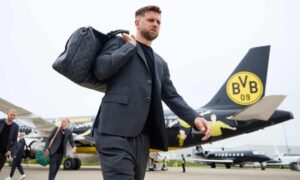
All week, and by small degrees, London has been turning yellow and black. Stickers on Tube escalators. Scarves tied to lampposts. A BVB-emblazoned padlock on the banks of the Thames at Westminster. Wide-eyed fans milling through the pubs of Soho, wincing at the beer prices. Trying to soak up every last available morsel of enjoyment from the experience before – you know – the actual football starts.
It’s a largely moot point whether Borussia Dortmund are the biggest final outsiders in the modern history of the Champions League. Perhaps Internazionale last season, perhaps Liverpool in 2005. Either way, given the opposition, their fifth-placed finish in the Bundesliga and the charmed passage they have enjoyed to the final, few give them a hope at Wembley on Saturday night.
“I believe we have a chance,” their chief executive, Hans-Joachim Watzke, said at Dortmund airport on Friday morning, which as rousing battle cries go, is towards the milder end of the scale.
And if Real Madrid are here for business and business alone, for Dortmund the equation has always been slightly more complex. Since Jürgen Klopp led them to a league and cup double in 2012, they have finished second in the Bundesliga seven times, lost nine out of 14 cup finals. If Dortmund seem to enjoy the journey more than most other clubs, partly this is because the destination has so rarely been kind to them.
Their last Champions League final, also at Wembley in 2013, had a similar ambience. Even at the time their narrow 2-1 defeat by Bayern Munich felt like a high-water mark, the culmination of the project Klopp had so spectacularly set in motion, and so it proved.
One by one the jewels of that brilliant team were picked off. Mario Götze, Mats Hummels and Robert Lewandowski by Bayern; Ilkay Gündogan by Manchester City; the rest by time and decline. Klopp himself hung on, until 2015, exhausted and beaten. Bayern were in the early stages of a run that would eventually end on 11 straight Bundesliga titles. And so, in the foothills of their rivals, Dortmund recognised the need to build something new.
Over the second half of the decade, Dortmund assembled a model that would become the envy of the continent. Teenage talents such as Jadon Sancho, Jude Bellingham, Erling Haaland and Christian Pulisic were identified, signed and moved on at an eye-watering profit. Dortmund were able to sell themselves to young players as a kind of finishing school: immediate minutes at an elite Champions League standard. It looked great on the balance sheet. Fans got to enjoy thrilling, high-energy football. Everybody won, as long as they were prepared to narrow their definition of “winning”.
